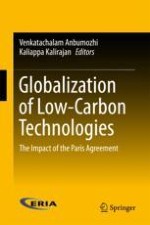2017 | OriginalPaper | Buchkapitel
15. Regulatory Instruments and the Diffusion of Low-Carbon Technologies in the European Union
verfasst von : Matthias Helble, Adam Majoe
Erschienen in: Globalization of Low-Carbon Technologies
Verlag: Springer Singapore
Aktivieren Sie unsere intelligente Suche, um passende Fachinhalte oder Patente zu finden.
Wählen Sie Textabschnitte aus um mit Künstlicher Intelligenz passenden Patente zu finden. powered by
Markieren Sie Textabschnitte, um KI-gestützt weitere passende Inhalte zu finden. powered by
